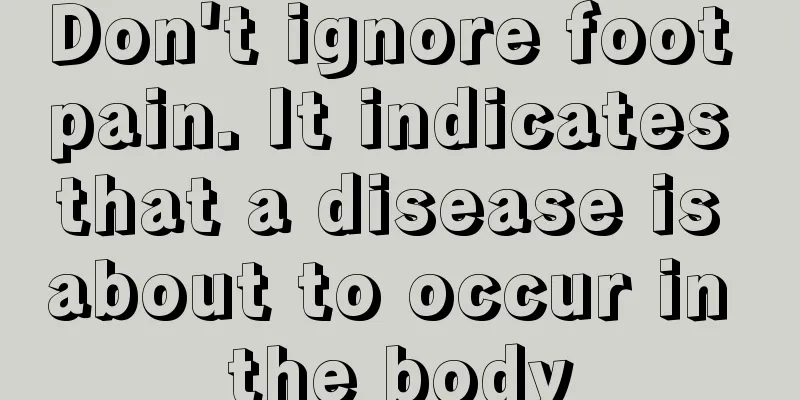Don't ignore foot pain. It indicates that a disease is about to occur in the body

|
As the saying goes, a journey of a thousand miles begins with a single step. If our feet are not well protected, we will be unable to move forward, so it is very important to protect our feet. But if you have pain in your feet, you must not ignore it. It also indicates that there are problems in other parts of your body. Swollen feet, foot pain, and foot cramps are all signs of problems in our body, so we must pay attention to them. 1. Swollen feet In addition to swollen feet caused by standing, sitting or squatting for a long time, and edema that occurs in women during menstruation and pregnancy, unexplained swelling of the feet may be a symptom of heart disease, endocrine disease and other diseases. 2. Numbness in both feet Numbness in the hands and feet of healthy people is mostly caused by the feet being in the same posture for a long time. This symptom will disappear on its own, but if it persists for a long time, or recurs, sometimes light and sometimes severe, it may be pathological numbness caused by a disease, such as thromboangiitis obliterans, and should be taken seriously. 3. Leg cramps If you always have leg cramps when you sleep, you should increase your intake of calcium, potassium and magnesium. When your leg cramps, you can massage the painful area or apply cold compress. To avoid cramps, stretch your legs before going to bed and drink a glass of hot milk. 4. Thick and yellow toenails Usually caused by a fungal infection, people are unaware of it, but the infection can quickly spread to all toenails, causing them to have an unpleasant odor and become darker in color. Experts say that if the nails are brittle, it means athlete's foot infection, but if the nails are just thick, it may be a damaged toe. 5. Pain in the soles of feet When walking, standing or pressing, the big toe joint and the sole of the foot are painful but there is no redness or swelling. This may be due to injury to the plantar muscles. You can soak your feet in hot water every night. If the sole of the foot hurts and the third or fourth toe also hurts, it may be caused by wearing high heels for a long time. It is recommended to alternate between wearing high heels and flat shoes. If you must wear them, it is best to choose shoes with wide toes and thick soles. If you have unexplained foot pain and also have symptoms such as thirst, frequent urination, hunger, and weight loss, you should consider whether you have diabetes. 6. Heel pain The vast majority of heel pain is caused by ligament inflammation, and ill-fitting shoes are the main cause. Wearing shoes with soles that are too hard, too soft, or too thin for a long time will cause problems. In addition, obese people are also prone to heel pain. Experts point out that to protect your heels, you must first choose the right shoes. The shoes you buy must fit your feet, leaving a horizontal finger's distance in front of your toes, and avoid wearing flat shoes with soles that are too thin. |
<<: How to solve the problem of hardening and bulging infusion blood vessels?
>>: What should I do if my arm hurts during infusion?
Recommend
Are silicone bras harmful to the human body?
Many women choose to use silicone bras in order t...
How long after teratoma surgery can I walk and exercise
It usually takes 1-2 weeks after teratoma surgery...
What are the causes of calf swelling?
Edema in certain parts of the body often occurs. ...
Why does my stomach growl with hunger
I believe everyone has experienced the situation ...
What is good to eat to regulate qi and blood? Eat more of these foods to regulate qi and blood
Qi and blood are very important for the human bod...
What should I do if I have a thick bump on my butt
What's the matter with the thick lump on the ...
Removing tea stains from thermos cup
Many people like to use thermos to make tea. If y...
Eat a full meal in the morning or eat well in the morning
As the saying goes, eat full in the morning, eat ...
8 acupuncture points to treat 8 common diseases and benefit you for a lifetime
There are 8 practical health-preserving acupoints...
Treatment methods for removing white spot wind
You may not be too familiar with the name "v...
What are the treatments for lung metastasis after rectal cancer surgery?
The treatment of postoperative metastasis of rect...
The cornea needs to be relaxed. 10 ways to relieve the "overworked cornea"
We stare at mobile phones and computers for a lon...
Does it hurt to do a gastroenteroscopy?
For patients with gastrointestinal discomfort, if...
Is regular massage effective for headaches?
In fact, after suffering from migraine, there is ...
Can I still get pregnant after breast cancer surgery
Can you still get pregnant after breast cancer su...









